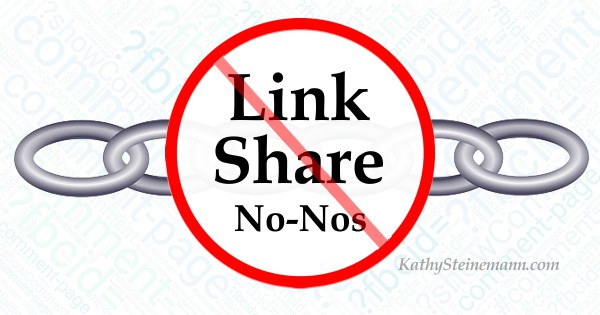
t’s Neighborly to Share Links
However, when you link to an interesting blog post or article, you should know what you’re sharing. Are you directing people to the top of the page — or somewhere else?
Note: Two of the active links in this post will open in new tabs. Two links contain an extra space after https: that I inserted to keep them from forming navigable URLs.
Nothing Speaks Louder Than Examples
Let’s scrutinize my article about exploiting facial expressions in writing:
https://kathysteinemann.com/Musings/expressions/ (opens in a new tab)
I left a comment. The page updated and took me back to where I left off. All is good.
However, when I examine my browser’s address bar, the URL has changed to
https: //kathysteinemann.com/Musings/expressions/#comment-9861
Which Link Should I Share?
Should I direct people to my comment or to the beginning of the post? To the beginning of the post, of course.
That means I need to remove everything from the # symbol on.
Here’s Another Example from WordPress.com
https://kathysteinemann.wordpress.com/2020/08/26/how-to-create-an-unforgettable-title-for-your-book/ (opens in a new tab)
I entered a comment, the page updated, and the URL in my address bar changed to
https: //kathysteinemann.wordpress.com/2020/08/26/how-to-create-an-unforgettable-title-for-your-book/comment-page-1/#comment-50
In this case, everything following the final slash in the original URL should be removed — once again, from the # symbol on.
Continue reading →
If you click on a Continue reading → link from a site (or its equivalent), the site will generate a URL that ends with something like this:
/#more-5711
Does this look familiar? As in previous examples, the # symbol and everything that follows it should be removed.
Blogspot Does It Too
Blogspot adds characters such as:
?showComment=1482591043540#c3426660869710627320
To fix, delete the question mark and all subsequent characters.
The pattern will be similar on most blogging platforms.
Beware Social Media Share Buttons
These buttons share the URL displayed in your browser’s address bar. So if you’ve posted a comment or accessed a Continue reading → link, your browser will relay the URL plus the extraneous information added by the site you’re visiting.
Ditto for News Portals, Magazines, Literary Journals, Etc.
Many sites add a jumble of letters, numbers, and symbols to all their URLs. Some URLs take up several lines.
The Backspacing Approach
Try removing everything that looks strange. If the link doesn’t work, go back one page and remove fewer characters. Then try the link again.
With a few seconds of experimentation, you’ll produce a streamlined URL that works and looks better.
Simpler Than Backspacing
The easiest fix is to be proactive and copy the URL from your address bar before you comment.
Effortless. Fast. User-friendly.
Important Points You Might Not Consider
- Social media sites like X (formerly Twitter) restrict the number of characters you can share. Eliminating the extraneous information in a URL will leave you more room to provide useful information and hashtags.
- If your links aren’t “clean,” fewer people will repost and reshare them.
That Includes Book Links
Amazon and other companies add superfluous characters to links for books, reviews, and subsidiary pages.
For more information, see Writers: Do You Know the Best Ways to Share Links?
The Writer’s Lexicon series
and additional resources on my Facebook page.
Discover more from KathySteinemann.com: Free Resources for Writers
Subscribe to get the latest posts sent to your email.

A definite pet peeve of mine, especially when promo services include long links in their HTML packets, and even worse, create tiny URLs from them.
I don’t know how their algorithm works (who does?), or how often they check, but using some of the Amazon long links is a violation of their terms of use, and heaven help you if you upset the ‘Zon! Clean up those links.
Heh heh. Yeah, I agree, Denise. Don’t upzet ze ‘Zon.
Great article! Thank you.
Thanks for reading, Connie.
Stay safe!
A useful post, Kathy. I always get the address from the address bar, and have had no problems, but then I don’t go straight from my comment. Seems I’ve been doing something right for a change. 🙂
Right on, Vivienne! Great to hear from you again.